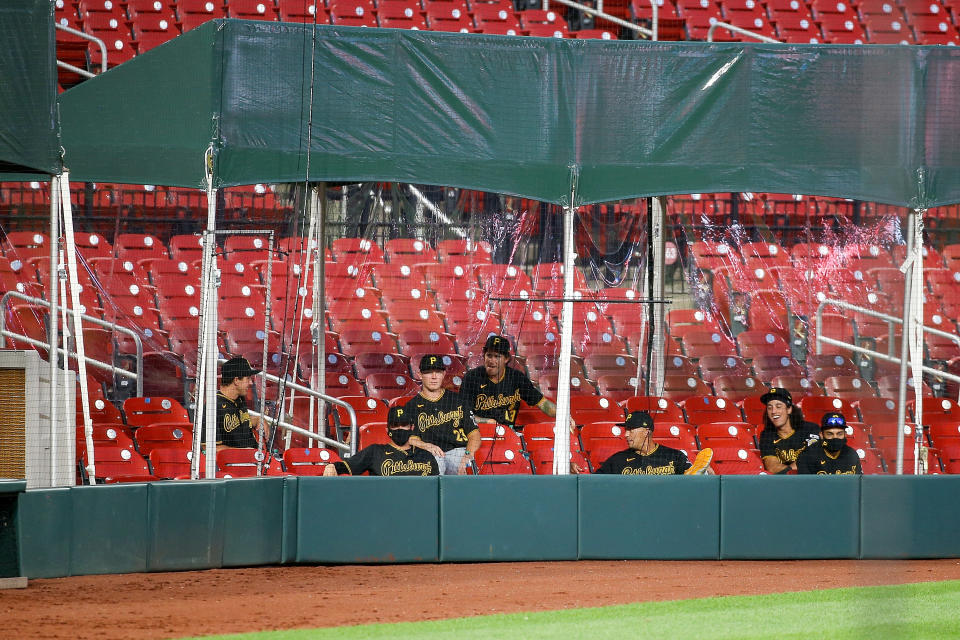Destined to fail? MLB's plan to play during the pandemic is simply not working
A lot has been made (including by me!) about how detailed and thorough and well-intentioned MLB’s 2020 Operations Manual is. All those diagrams and subsections and footnotes creating the impression that the series of protocols are sufficient for outthinking the coronavirus pandemic. But just because a plan is long doesn’t mean it’ll work. Not all plans are equally viable.
Here are some facts:
For the past two-plus weeks, the MLS tournament taking place in a bubble in Orlando, Florida has registered zero positive COVID-19 cases.
The latest weeklong batch of tests of NBA players participating in the season’s resumption at Florida’s Disney World resort also returned zero positives.
At least 13 players and coaches on the Miami Marlins alone have tested positive for COVID-19 in the past two days.
One of these plans is not working as well as the others. The difference, at least over the past week, is whether or not there’s a so-called bubble system sequestering athletes as a way of mitigating spread from the community.
Months ago, MLB briefly considered a bubble, or multi-bubble plan, in places like Arizona and Florida where there are abundant spring training facilities (but also soaring summer temperatures and COVID cases). Players balked at being isolated from their families, and the league quickly dropped the issue entirely.

The season they eventually designed involves teams staying within their geographic region, playing exclusively against their division and the corresponding division in the other league. This certainly simplifies the travel and makes it more feasible (logistically speaking) to play 60 games in 66 days. But it isn’t any sort of concession to how contagious and dangerous COVID-19 is.
Baseball is socially distant by nature on the field, but being in a locker room, in the dugout, or on a team bus is not. The problem remains that players have plenty of opportunity to contract the coronavirus in their various home communities — especially if those happen to be in states that are experiencing unprecedented spikes — and spread it to one another at the baseball stadium or en route to a stadium in a different city.
That’s a problem for MLB. And it’s a problem for the country when you consider that those players could be spreading it to support staff and other essential workers who don’t have access to the same robust testing systems and health care.
It took only a few days of sports action outside of a bubble for exactly that scenario to start to unfold. Even if the cost from this particular outbreak is “only” a couple of games and the health of a handful of players, MLB should seriously consider whether this outcome is inherent to the plan it implemented and effectively unavoidable if it sticks by it going forward. Because people saw this coming. Playing without a bubble was a bad idea, that much was predictable.
When I interviewed Dr. Arthur Caplan, the founding head of the Division of Medical Ethics at NYU School of Medicine and a co-chair on the Mayors Advisory Panel on Sports, Recreation & Health, I was interested in big, intangible ideas like whether fans have a moral obligation to not enjoy the baseball season if it got underway. By contrast, he wanted to rail against the specifics of the plan MLB was implementing.
“I don’t even get minimally why they’re trying this travel thing,” he said with evident frustration.
And, against my rhetorical counter that canceling a season would cost jobs, “You should hope that you can keep a job and everybody understands that, but at the same time it doesn't mean you have to take the more stupid plan.”
The “more stupid plan” is the one that puts teams on planes and buses and into hotels and at restaurants all over the country, in and out of hot spots.

In an era defined by meme-ified uncertainty, some things are clear. Like whether it would be more ethical to play sports in a bubble.
“Yes,” Caplan said unequivocally.
To be fair, I do have some idea why they’re trying this travel between home stadiums thing. Baseball has a lot more people playing a lot more games on much bigger playing surfaces. Identifying one or more sites that can contain an entire baseball season for multiple teams with sufficient broadcast capabilities might be impossible.
Beyond that, life within a sport-mandated bubble sounds strange and lonely. It’s dystopian and dehumanizing to shuttle our athletes between hotels and stadiums while critically monitoring the rest of their movements for the sake of televised entertainment and billionaire team owners’ income. If athletes opt out of a season in a bubble, I wouldn’t begrudge them.
Instead of heavy surveillance and a secure campus, MLB has opted to rely on personal responsibility at every turn. In news conferences, clubhouse leaders stress the importance of unity and communication, putting their faith in the fact that their teammates understand how one guy can mess this up for everyone. After the first round of positive cases cropped up on the Marlins, the team asked veteran shortstop Miguel Rojas if they should still play the game. The commissioner retains the power to postpone games or suspend the season, but the league can’t force teams to play if they feel unsafe.
Athletes are conditioned for discipline, the reasoning goes. But they’re also conditioned to play through the pain. They’re not infectious disease experts or public health advocates, no matter how much we want this season to be justifiable as a model of best practices. Relying on personal responsibility to combat the pandemic is proven to fail.
Even if players were clamoring for a season, the onus for keeping them and the broader community safe was on the league. Maybe a bubble would have been sufficient and feasible or maybe not. But the current plan clearly isn’t.
More from Yahoo Sports:
